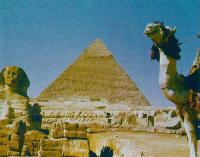Lost Prophecy
THE STORY OF EGYPTIAN JEWS
By Mary Halawani

Egyptian Jews belong to a very ancient culture. In biblical times, when Jacob and his family fled from the famine besieging the land of Canaan, Egypt opened its doors. It was in Egypt that the children and grand children of Jacob-Israel multiplied and became a people of twelve tribes.
It was also in Egypt that my family was forced to repeat the biblical exodus of Moses’ time. Like thousands of Jews (an estimated 75,000 in the 1950’s), they had to leave behind a lifetime of friends and possessions. I experienced this exodus as a child. I was forced to grow up in an alien culture, longing for the land and the time that my grandparents had lived in.
Background :
The Jews of Modern Egypt
At one time, Egypt’s was the most urban of all the Jewish communities in Asia and Africa, with 96 percent of its population living in Cairo and Alexandria. In 1947, 59 percent of the "registered" 65,000 Egyptian Jews were merchants. Egypt had several Jewish multi millionaires, and four of the top department stores were Jewish owned.
Jews were very much integrated in the multi-ethnic "Mediterranean Society" of Egypt; They were consultants to the various viceroys, bankers and senators. Even Nasser’s favorite actress was Jewish!.
Within an historical perspective, the Jewish population of Egypt can be traced and divided into three distinct groups; Mizrahi Jews (Arab), Sephardic Jews (Spanish), and Ashkenazi Jews (mostly Polish and Russian).
The "Mizrahi"n Jews were the original Jewish population of Egypt. While maintaining Judaism to a very high degree, they became a part of Egypt’s culture, flourishing as Egypt flourished. They were doctors, lawyers, and advisers to the various rulers.
Starting in the 16th century, another group of Jews came to Egypt after their expulsion of 1492 from Castille and Aragon, and later on from Portugal. These "Sephardic" Jews spoke "Ladino" in their homes (Judeo-Spanish).
Consequently, their language separated them from the Arab speaking Jews.
The third and most recent group of Jews immigrating to Egypt were the "Ashkenazim" coming from Eastern Europe in the early 1900’s. They also maintained a separate culture, speaking Yiddish, and establishing their own centers of worship in Egypt.
Each group of Jews set up different school systems. Each responded uniquely to Zionism. Their differences, of course, did not end when the Jews departed from Egypt. Throughout the world, separate communities were developed by each group.
Egyptian Jewish Leaders and Synagogues.
Traces of the Jews in Egypt can be found in the book of Jeremiah (44:1) which attest that there were Jews in Egypt as early as the First Temple period.
The Jewish-Egyptian connection has always been strong. After fleeing a repressive Spain, Maimonides, the "Rambam" settled in Cairo in 1165 where he became the leader of the Egyptian Jewish community, and was appointed physician to Sultan Saladin.
The renowned Kabbalist Isaac Luria was born in Jerusalem, but brought up in Cairo. His mystical interpretations of the "Zohar" were conjured up in a hut along the Nile.
The Ben Ezra Synagogue in Old Cairo dates back to the 9th century. It was from a stream in the back of the synagogue that baby Moses was pulled to safety by an Egyptian princess. Egyptian Jews traditionally claim that Moses personally touched the parchment of its prayer books, saying his last prayers before he left Egypt. It was in Ben Ezra, in 1896 that Solomon Schecter, a scholar, rediscovered the Genizah, a storage place for sacred documents, including a 2,500 year old Torah and thousands of ancient manuscripts which confirm the presence of Jews in Egypt during the reign of Babylon’s King Nebuchadnezzar in 600 BC.
There were over 100 synagogues in Egypt in the 1950’s. Today, the remnants of the Rabbi Moshe Ben Maimon Synagogue in Cairo’s old Jewish quarter, named after Maimonides, stands open to the sky.
According to its caretaker, the roof collapsed on October 6, 1973, the first day of the Yom Kippour War. At one time, the Maimonides Temple was where both Jewish and Moslems in failing health went to find a cure. Today the Great Synagogue on Adli Street is the only place of worship available to Cairo’s Jews for regular services. The synagogue was recently renovated by the World Sephardi Federation, and it is said to be the place where president Anwar El Sadat and prime minister Begin of Israel met to discuss the peace process between the two countries.
The 20th Century Exodus
On a personal level, there had been peaceful co-existence between Jews and Arabs for generations. It was not a "people’s war" but a political one that made the Jews leave in the 1950’s. In 1948 with the creation of Israel, a nationalistic spirit with an anti-Semitic character set in. When Nasser came to power in 1954, reinforcing nationalism, many Jews arbitrarily were placed in detention camps, their property confiscated while synagogues were set aflame.
The Sinai Campaign of 1956 was the climax of anti-Semitism in modern Egypt. Thousands of Jews were arrested, interned in camps, and forced to flee the country.
The third and final surge of emigration coincided with the outbreak of the Six-Day War in 1967. All Jews of army age were detained in prisons and many were asked to leave the country when freed. With the help of the HIAS and the International Red Cross, Jews left the country in whatever way they could. By 1971, only an estimated 400 Jews remained in Egypt.
After the mass exodus, most of the synagogues, social welfare organizations, schools, and newspapers closed. The Jewish community rapidly deteriorated. Faced with a severe housing shortage , Egyptian families and their herds of goats have made their home in neglected Jewish cemeteries. The civilized, cultured society of Egyptian Jews has become almost a memory, one which Lost Prophecy my film seeks to honor and preserve
